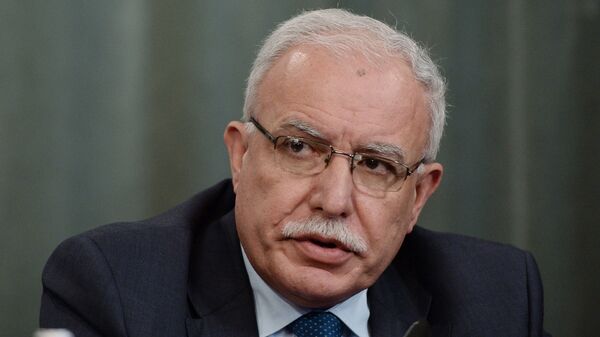MOSCOW (Sputnik), Svetlana Alexandrova – Potential Israeli-Palestinian talks held up by Israeli Prime Minister Benjamin Netanyahu are unlikely to be productive, Palestinian Foreign Minister Riyad Maliki told Sputnik on Wednesday.
Negotiations between the two Middle Eastern nations have been stalled since they were suspended in late April 2014 on accusations of Palestinian leader Mahmoud Abbas aligning with Hamas.
"Even if under certain conditions Netanyahu might accept the resumption of negotiations, he will never allow these negotiations to come to any fruitful results," Maliki said.
Speaking to Sputnik after the UN International Meeting in Support of Israeli-Palestinian Peace held in Moscow, the diplomat recalled Netanyahu’s comments last month rejecting "international dictates" to resume peace talks.
"Let’s not fool ourselves, Netanyahu was very sincere when he said during the elections: ‘as long as I am Prime Minister of Israel, I won’t allow the Palestinian state to emerge," Maliki said.
In an interview with Israeli media a day before the March 17 elections, the Israeli leader said "indeed" in response to a question whether he would oppose the creation of a Palestinian state during his premiership.
Maliki cited ongoing Israeli settlement-building in occupied territories, criticized by the international community, as a sign of Netanyahu’s unwillingness to renew negotiations.
Palestinians pursue the diplomatic recognition of their independent state in the area of the West Bank, including East Jerusalem, partially occupied by Israel, and the Gaza Strip. So far, 135 out of 193 UN member states recognize the State of Palestine.
Riyad Maliki also claims that Benjamin Netanyahu wants to kill two birds with one stone in talks with Palestinian Hamas movement — to get rid of Gaza and get full control of the West Bank.
In his recent interviews Palestinian leader Mahmoud Abbas stated that Israel and Hamas Islamist movement controlling the Gaza Strip have had direct contact with each other.
"The maximum [in the negotiations] is that Israel will accept that Hamas will declare an independent state in Gaza and Netanyahu will say, 'so here you go, you have your state now, you need to forget about West Bank as it will stay forever as a part of Israel.' In this case Netanyahu wants to get rid of Gaza…and to get full control of the West Bank," Maliki said.
In December 2014, a draft statehood resolution was submitted by Palestine to the United Nations Security Council but was subsequently vetoed by the United States and Australia.
The State of Palestine is currently recognized by 135 of the 193 United Nations member states, including Russia.
Maliki also says that a 18-month time frame proposed by France to resume peace talks between Israel and Palestine is sufficient to reach an agreement between the two Middle Eastern nations.
"When we say 18 months for any kind of an agreement, it is really we are giving enough time for reaching an agreement," Maliki told Sputnik.
Fabius’ proposal is reported to be presented to the UN Security Council vote in September. It is the latest effort to bring Israel and Palestine to the table in over two decades.
Maliki said it was imperative to go into the next round of talks with specific objectives in mind.
"We can add another two or three months but we cannot go back to negotiations for the sake of negotiations without defining a timetable," he reiterated.






